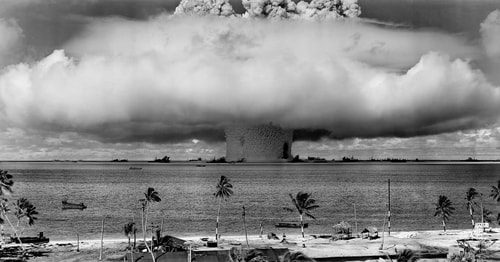“Nuclear weapons aren’t a thing of the past and Christians should be aware how real the threat is. I’m looking forward to the day when Jesus returns but would rather not see it happen because of the use of nuclear weapons.”
These are the words of Russell Whiting, development manager at Christian Campaign for Nuclear Disarmament (Christian CND). In this interview, he reveals that after becoming a Christian, he reviewed his outlook on different life issues and, “scared” by the potential threat of nuclear weapons, started to actively campaign for nuclear disarmament. Now he wants to raise awareness of nuclear weapons among the UK’s evangelical community and encourage Christians to pray for peace.
What do evangelical Christians need to know about nuclear weapons?
Sadly, nuclear weapons don’t exist only in an abstract political world and they’re not an issue of the past. The topic of nuclear weapons didn’t disappear with the end of the Cold War. It’s not only countries such as Iran or North Korea that can press the button, but the UK, France and other western democratic countries can, too.
Nuclear weapons could be set off at any time and we need to think about the consequences. It’s important to know that Great Britain has nuclear weapons and is not only maintaining current arsenal but also working on more modern weapons.
During the Cold War the risk of nuclear weapon use was so high that a lot of people were engaged in the issue. With the fall of the Berlin Wall a lot of people felt it had gone away. But it hadn’t, and nowadays, it’s coming back, even more powerfully.
It also costs the country billions of pounds every year to keep nuclear weapons and to modernise them. In a few years, we’ll have the smallest army we’ve had in 400 years: the Royal Air Force (RAF) suffers from cuts, but so much money goes into modernising our nuclear potential which is all about mass killing.
The International Atomic Energy Agency and the Stockholm International Peace Research Institute (SIPRI) are some of the best sources to go to for information on nuclear weapons.
What can the UK church do about this issue?
In 2017 the United Nations passed the Treaty on the Prohibition of Nuclear Weapons (TPNW), which is the first ever legally-binding international agreement to prohibit nuclear weapons, with the goal of leading towards their total elimination. In order to come into effect, it needs to be signed and ratified by at least 50 countries. The UK hasn’t yet signed it and is not doing anything towards ratifying it.
The evangelical church is growing quickly, and if its leaders said that nuclear weapons are wrong and would stand up and mobilise people to pray, that would make a difference and could put pressure on the government.
If the evangelicals around the world prayed for peace, it would be powerful. They would join other denominations that are already involved. We publish a monthly prayer diary on our website that can be used by churches and anyone, for that matter, to pray for peace and for our work.
How can churches make a difference at a local level?
One of the most important things is to build awareness and educate people. Christian CND is currently building a speakers’ network that churches will be able to tap into and invite people to speak about the issue. Additionally, every church can make sure that if it’s making any financial investment, it goes to the right place and doesn’t support nuclear weapons in any way.
What’s encouraging to me is that the church has found a voice to speak about austerity, setting up foodbanks – something that hasn’t been done before. In my view, it’s now the time to ask why we’ve got poverty and homeless in our communities; I think it’s because money goes to nuclear weapons and the problem is much deeper than we think.
Why is it essential that we don’t overlook that subject of nuclear disarmament?
Knowing how many problems we’ve got in the world and what the churches are also dealing with, I know that this is one of many topics. But we need to be aware that the threat of nuclear weapons is real. During the Cold War there was a kind of understanding between the leaders of USA and USSR. Today, more countries have nuclear weapons and the leaders are less predictable. Pakistan is the country I’m most concerned about. Its internal situation is very volatile and you don’t know what to expect there. What’s more, with the things happening around North Korea and Iran, use of nuclear weapons is more realistic than ever before. It is the right time to talk about nuclear disarmament.
How did you come to be involved in Christian CND as an evangelical?
I joined CND when I was 15, even before I was a Christian. It was the time when the Iraq war was coming and, honestly, my main concern was that I didn’t want to die. I was aware of the potential risk and damage the weapons could do, so I wanted to support the campaign.
But I didn’t do much at the time. It was only when I became a Christian, during my last year at university, that I got actively involved in the Christian section of CND. I started reviewing my lifestyle, how I approached certain things, and this was the right thing for me to do. Later on I took to a job in CND and then in Christian CND.
How does your faith relate to and inform your views on nuclear disarmament?
Before I got saved, I thought: I don’t like them but they’re there anyway. Today, I know that this is something we need to act on now. The more I reflect on Jesus coming and dying to make peace between humanity and God, the more I think about how I make peace – either in my community or on a global level.
When you look through the Bible, you’ll see there’s no place for weapons. Yes, there are wars recorded in the Old Testament, but we live in the times of the new covenant. It’s about love and peace. Jesus said that “blessed are the peacemakers” and “love your neighbour”. In Romans 12:10, we read: “Be devoted to one another in love”. Use of nuclear weapons doesn’t align with that.
As Christians we’re to have a radically different worldview and live it out. Isaiah 2:4 says: “In the last days (…) nation will not take up sword against nation, nor will they train for war anymore. No more war, no more nations fighting with each other.”
The Bible also says we should not repay evil with evil, but that’s what a lot of current UK policies are based on: they say that we’ll only launch a nuclear weapon if someone else does it first. That’s not right and certainly not biblical.
What is Christian CND’s history and what does it do today?
Christian CND will be celebrating sixtieth birthday next year. It was created two years after the national CND, because Christians wanted to do something uniquely Christian to campaign against nuclear weapons. Current work focuses on campaigning for UN treaties such as the TPNW, which I mentioned earlier. We also work with the Church of England on raising awareness of this treaty.
In July 2018 the Church of England passed a motion on the treaty. It’s a key step as we seek to raise awareness of the treaty among Christians and engage believers in our work. Raising awareness of what we do and nuclear weapons in general is extremely important to us; that’s why we’re also equipping our members and building the speakers’ network.
Do you have to be a pacifist to support nuclear disarmament?
Not at all. Many Christians I know of support nuclear disarmament because of the money it costs the UK to maintain and modernise the arsenal. I’m a pacifist myself even though CND isn’t. Even if one believes in Just War theory, nuclear weapons are so powerful that they’re beyond that. Those who support nuclear weapons need to remember that their use will lead to the end of the world as we know it. I look forward to the day when Jesus comes back, but I wouldn’t want that to happen as a result of use of nuclear weapons.
Is it utopian to want a world without nuclear weapons?
In a way it is utopian, but as Christians we’re called to build a better society. Two hundred years ago British politician William Wilberforce was probably called utopian. We need to see beyond society as it is now.
On another hand, it’s realistic: it costs so much money to keep such arms, and we could use this money in a better way, so wouldn’t any realistically-thinking person would want to get rid of nuclear weapons?
If the UK led on nuclear disarmament, would it have any impact on other countries and the wider world?
It would depend on what we would do afterwards. We would not only need to get rid of nuclear deterrents but also call a special conference with the other eight countries that have nuclear weapons, put timeline on getting rid of them, and monitor the progress. The first country to give up nuclear weapons will have a moral responsibility to monitor the others.
Given the distrust, fear and power struggles between countries, ought we not to focus on reconciliation and peace more generally, rather than on weapons more specifically? Is this something you pray about?
It’s important to keep focus on a particular issue. If we were to get rid of nuclear weapons, it would be a result of a new outlook on peace and security and would influence how we approach other problems in today’s world.
What would you say to Christians who feel that God has called them to serve their country sacrificially in the armed forces, including those who serve on nuclear submarines?
We want to honour their service and we know that it’s not an easy job. It’s often done in secret and those people live a tough life away from family. At the same time we believe their skills could be put to better use with more social benefit. No one should live with the responsibility of pressing the button.



